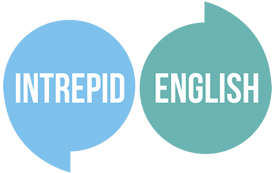“You want to improve your English, don’t you?”
What are question tags? They are the little questionettes we add onto a sentence and are used a lot in spoken English.
They are incredibly useful to help you sound more natural to native speakers.
Recently, I covered this topic in my Ask Us Anything Friday live on our YouTube channel! You can find that video below. I go live every Friday to answer your English language questions on grammar, pronunciation, idioms, vocabulary and more, so if you have a question, make sure to submit it by leaving a comment below, or send us an email!
Don’t forget to download your free tag questions cheat sheet at the bottom of the blog!
There is nothing wrong with asking standard questions but for example if I think I know my friend likes swimming, it is more natural for me to say:
“You like swimming, don’t you?”
Instead of the standard question:
“Do you like swimming?”
How do we form a question tag?
It depends on the main part of the sentence. If the main sentence before adding the question tag is positive then the question tag is negative:
“You like him, don’t you?”
If the main part of the sentence is negative then the question tag is positive:
“You don’t like him, do you?”
Another important point on how to structure a question tag is that we need to look at the verb in the main sentence.
If the verb is a normal main verb (like, live, work, sleep, eat, drive etc) then we use the auxiliary verb “do” in the correct form.
For example:
“She lives in Paris, doesn’t she?”
“He worked with you before, didn’t he?”
“They didn’t explain how it works, did they?”
Now if the main part of the sentence already has an auxiliary verb (be, do and sometimes have) or the modal verbs (will, would, can, could, may, might, must, shall, should) then we use them again:
With the auxiliary verb ‘be’:
“You are hungry, aren’t you?”
“We weren’t tired, were we?”
“I’m allowed in, aren’t I?”
(Note it’s impossible to say ‘amn’t I’ so we use ‘aren’t’ with the first person)
With the auxiliary verb ‘do’:
“It does the job, doesn’t it?”
“You don’t know the way, do you?”
When is ‘have’ an auxiliary verb and when is it a main verb?
Let’s compare these two sentences:
“You have a car.”
“You’ve bought a car.”
In the first sentence ‘have’ is used as a main verb to talk about ownership/ possession so to add a question tag we use the auxiliary ‘do’:
“You have a car, don’t you?”
In the second sentence, ‘have’ is used as an auxiliary verb so it is used again in the question tag:
“You’ve bought a car, haven’t you?”
With the modals:
With the modals here are some examples where we use them again in the question tags:
“You can speak English, can’t you?”
“She won’t come, will she?”
“I should go home now, shouldn’t I?”
Why use question tags instead of a normal, standard question?
As I mentioned it is often more natural in spoken English and for these 2 very important reasons:
Asking for agreement & confirmation:
1. We use question tags often when asking for agreement, when we are 90% certain of the answer: “This place is beautiful, isn’t it?”
2. We also use it when asking for confirmation so when we think we know the answer but we just want to check: “She’s from Scotland, isn’t she?”
Now intonation is key.
Our intonation goes up at the end with the question tag when we want to express that it is more of a question, a confirmation on what we think we know. Our intonation goes down when we are more certain and just looking for agreement.
Now you know about question tags, time to use them!
Download your free Tag Questions Cheat Sheet right here.
Practice activity
Now it’s time to test yourself on question tags with this exercise. Select the correct answer to complete the sentences:
- It’s hot here, _____________?
a) doesn’t it? b) isn’t he? c) isn’t it? - He’s not that tall, _______________?
a) doesn’t he? b) is he? c) isn’t he? - She hasn’t started, _______________?
a) has she? b) hasn’t she? c) doesn’t she? - I’m not too early, ________________?
a) don’t I? b) am I? c) aren’t I? - You started studying English last year, ______________ ?
a) didn’t you? b) did you? c) don’t you? - He’d like to move to Australia, _________________?
a) doesn’t he? b) isn’t he? c) wouldn’t he? - You won’t forget to text me when you get there, _________________?
a) don’t you? b) will you? c) won’t you? - He will come tomorrow, _______________?
a) will he? b) isn’t he? c) won’t he? - I should go to the gym, ________________?
a) shouldn’t I? b) should I? c) don’t I? - She can speak four languages, ________________?
a) couldn’t she? b) can she? c) can’t she?
Answers
1)C 2)B 3)A 4)B 5)A 6)C 7)B 8)C 9)A 10)C
Intrepid English Members can study tag questions in more detail as part of the Small Talk course in the Intrepid English Academy.
